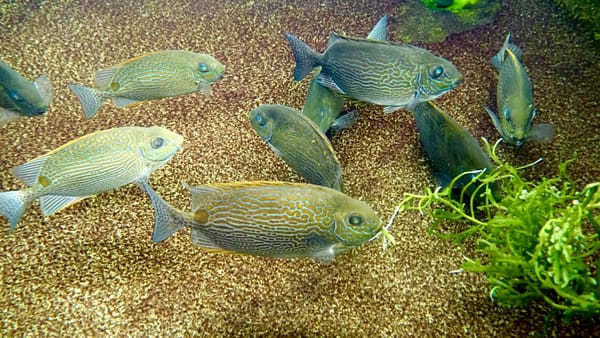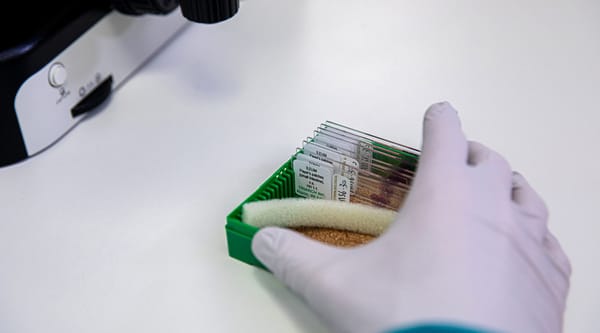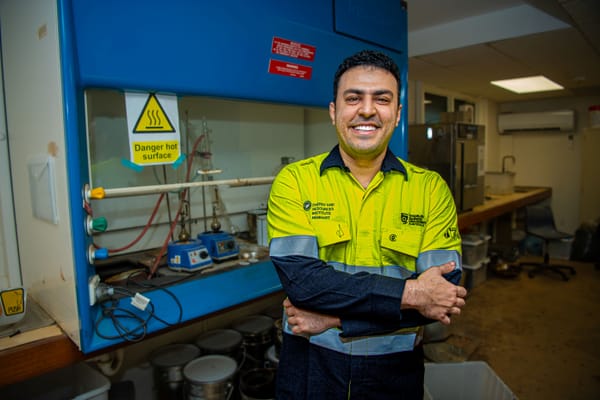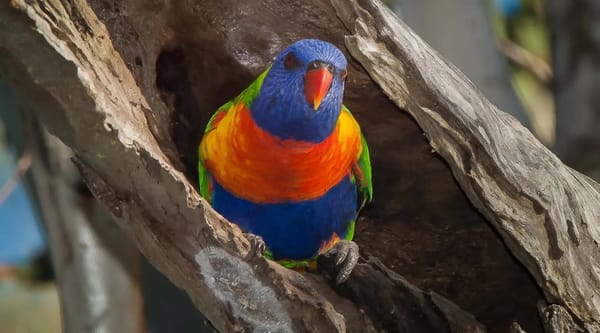Protecting Indigenous knowledges
During his research to unlock the archives, Dr Hodgetts found that the keys had been long-kept from cultural knowledge-holders.
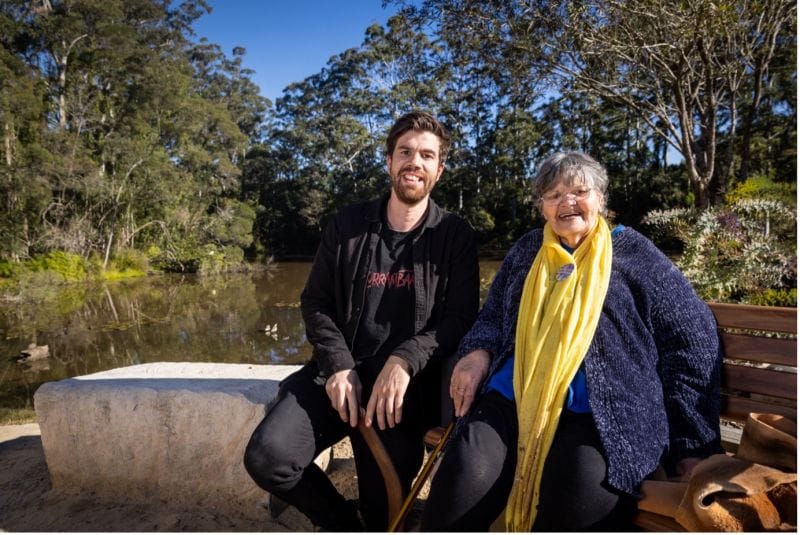
First published by the University of Newcastle
By Shahni Wellington
Sitting on the banks of the Ourimbah campus yarning circle, Wangaaypuwan and Wiradjuri man, Dr Jesse Hodgetts, sings with a smile alongside his nana, Anita Selwyn Shipp.
The two share a harmony as she taps along to the beat of the clapping boomerangs.
“Jacky Jacky was a smart young fella…”
It’s a short, joyful melody. Anita, a proud Wiradjuri woman, quips how her dad would sing it, recalling deep in her memory as a child growing up in Dubbo in the state’s west.
For many years, the sound lay dormant and peaceful in Anita’s subconscious. Until one day her grandson Jesse, who recently completed his PhD at the University of Newcastle, started a familiar tune.
“This song actually had four verses,” Dr Hodgetts said, explaining how the first few lines in English would later expand into lingo.
“Nan grew up knowing that her dad knew songs in Aboriginal language, and knew some language, but never talked about it to them because of the times - If your kids were speaking language, you were put at risk of being stolen or taken away… So that wasn't passed on, only that one little song.”
“So, when I showed the full song to my nana, she said how could I forget that!” Dr Hodgetts recalled.
Similar iterations of the same song were documented from other communities in New South Wales, as well as many other recordings in language, found while completing his thesis titled ‘Guthi Girrmara ‘Stirring Up Songs’: Reawakening Archived Wangaaypuwan and Wiradjuri Songs to Inform our Culture, Language and Identity.’
The exchange between grandmother and grandchild is a glimpse into the power of song, story and kinship for First Nations peoples. It also offers a peek into the enormity of how language and culture shapes identity, and the emotion of being reminded, and reunited, with even small parts of what was systematically taken away.
Beginning his work as an academic, Dr Jesse Hodgetts wanted to help further revitalise language and songs from his own communities. Along his journey of unlocking the archives, Jesse found that the keys had been long-kept from cultural knowledge-holders.

When it came to Dr Hodgetts work, he was determined to credit those who had held and continue to uphold story and songlines, while also citing those who had studied and documented his peoples across the decades.
The body of work explored the origins and stories of Wangaaypuwan and Wiradjuri song and the structures and musical patterns they followed.
It was a very particular skillset that allowed Dr Hodgetts to pursue his thesis topic. A love of music from an early age saw him pick up a range of instruments, an ability to read music and written notation, and Dr Hodgetts went on to complete a Bachelor of Music while performing professionally. His continuous connection to culture and the privilege of learning language from respected knowledge-holders gave him a strong foundation to interpret spoken word. Lastly, a western education equipped him with the tools to navigate data permissions and archives, to hear recordings and see written notes on the songs thought to have been lost and not hidden.
It was a combination of these qualities and factors that enabled Dr Hodgetts to carry out his research and access the oral history of those before him.
It’s a unique skillset, and unfortunately exposes an inequality in access that has grown over time.
Dr Hodgetts is now advocating for community-controlled archives, among other mechanisms, to ensure rights to cultural knowledge and intellectual property are strengthened.
The lessons learned from traditional songs structures are also being used to create new stories and further empower language-use.
“There's been a number of times where Elders will share stories, and I’ll ask, ‘Is there a song for that?’” Dr Hodgetts said.
“And they say ‘no, but we need one so the story can be kept’ - So there’s a big part of revitalisation by putting them song styles in here.”
Historically, Indigenous communities and knowledge holders have been seen as participants or informants in projects involving their cultural knowledge.
The University of Newcastle is doing their part to ensure there are different ways of doing business, that see First Nations peoples and individuals receive due recognition, respect, and entitlements.

A new standard
Historically, institutions and researchers have not been the benchmark for upholding Aboriginal and Torres Strait Islander rights to intellectual and cultural property.
It’s why the University of Newcastle has set a new standard on how it engages with Indigenous communities and hopes to provide a best-practice example for the tertiary sector.
After multiple years of work and consultation, the Indigenous Cultural and Intellectual Property (ICIP) Protocol and Guide was launched this year by the University – created in collaboration with renowned Indigenous legal firm, Terri Janke and Company.
Wiradjuri man and Pro Vice-Chancellor of Indigenous Strategy and Leadership, Nathan Towney, said the new protocol and community guide go hand in hand.
“It was integral for us to develop both of these documents in partnership with First Nations legal firm, Terri Janke and Company, and demonstrate relationship-building based on trust in all the work that we do,” Mr Towney said.
“By developing both an internal protocol and external guide we are holding ourselves to a higher standard in engaging with communities, while also empowering people on the ground to know and understand their rights when dealing with any business or institution,” Mr Towney said.

